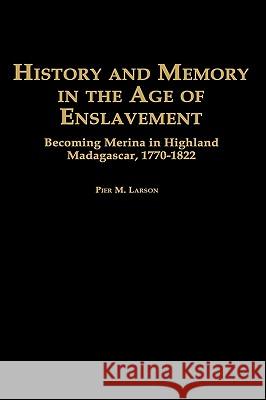History and Memory in the Age of Enslavement: Becoming Merina in Highland Madagascar, 1770-1822 » książka
History and Memory in the Age of Enslavement: Becoming Merina in Highland Madagascar, 1770-1822
ISBN-13: 9780325002170 / Angielski / Twarda / 2000 / 440 str.
History and Memory in the Age of Enslavement: Becoming Merina in Highland Madagascar, 1770-1822
ISBN-13: 9780325002170 / Angielski / Twarda / 2000 / 440 str.
(netto: 411,90 VAT: 5%)
Najniższa cena z 30 dni: 429,01
ok. 16-18 dni roboczych
Bez gwarancji dostawy przed świętami
Darmowa dostawa!
In this story of the impact of slave trade on an insular African society, Larson explores how the people of highland Madagascar reshaped their social identity and their cultural practices. As Larson argues, the modern Merina ethnic identity and some of its key cultural traditions were fashioned and refashioned through localized experiences of enslavement and mercantile capitalism and by a tension-filled political dialogue among common highland Malagasy and their rulers. Larson's analysis expands traditional definitions of the African diaspora to include forcible exile of African slaves within the African continent as well as areas external to it. By locating Merina history within wider narratives of merchant capitalism, African history, African diaspora, and Indian Ocean history, Larson has produced a book that both recognizes the diversity of historical experience and highlights the structural connections of intercontinentally joined systems of forced labor. In this story of the impact of the slave trade on an insular African society, Larson explores how members of the Merina Kingdom of highland Madagascar reshaped their social identity and their cultural practices. With great skill and insight, Larson places Merina history within two scholarly traditions: that on the Atlantic slave trade and that on ethnicity and the making of ethnic identities in Africa. Using a broad range of indigenous traditions and well-informed European sources, Larson gains access to an inner history that eludes most scholars working on the slave trade in other parts of Africa. By locating Merina history within wider narratives of merchant capitalism, African history, African diaspora, and Indian Ocean history, Larson has produced a book that both recognizes the diversity of historical experience and highlights the structural connections of systems of forced labor in various parts of the world.











